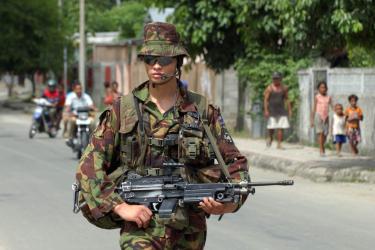East Timor

New Zealand imperialism in the Pacific in the 21st century
Australia’s national interest versus Timor-Leste, 1941-2006

For more on East Timor, click HERE
Brian Manning (1932-2013): Charlie India Echo Tango calling Timor Leste

On November 3, 2013, Brian Manning – veteran Northern Territory communist, trade unionist, campaigner against racism
Cuba's internationalism: 11,000 doctors graduate; 5315 Cuban and 5694 from 59 other countries

By José A. de la Osa, Havana
July 19, 2012 -- Granma.cu -- This July, 11,000 students are to receive their degrees as doctors of medicine; 5315 Cubans and 5694 students from 59 other countries, the highest total in the history of Cuba and an eloquent example of internationalist solidarity. These young graduates completed their studies free of charge in Medical Science Universities recognised for their high scientific level and social commitment to the poorest in the world.
Countries with the largest number of graduates are Bolivia, with more than 2400; Nicaragua, 429; Peru, 453; Ecuador, 308; Guatemala, 170; and Colombia, 175.
According to information given to Granma by the Advanced Medical Studies Department attached to the Ministry of Public Health (MINSAP), the total of this year’s graduates amounts to 32,171 health professionals, both Cuban and from other countries, including the careers of medicine, dentistry, psychology, nursing and health technology, which has 21 units.
East Timor celebrates medical milestone, with Cuba's assistance
By Lisa Zilberpriver
December 27, 2011 -- SBS (Special Broadcasting Service, Australia) -- Cuba is widely regarded as a world leader in medical outreach programs for developing nations. It began by sending doctors to support Algerian revolutionaries in 1963, and has since extended its programme to encompass more than 100 different countries.
There are more than 30,000 Cuban health workers stationed worldwide. The Cuban government also pays for the education of thousands of students from developing nations at the Latin American School of Medicine.
Tim Anderson is a senior lecturer in political economy at the Univeristy of Sydney. He has closely followed Cuba's medical outreach programs for several years. He hosted an East Timorese graduate of Cuba's program on a visit to Sydney health institutions in October that was organised by the Australia Cuba Friendship Society.
Left debates Libya: Imperialist nature of war is now clearer

Aftermath of a NATO airstrike on Tripoli.
[For more left views on Libya, click HERE for articles and associated comments.]
By Michael Karadjis
June 23, 2011 -- Links International Journal of Socialist Renewal -- Renfrey Clarke has written a very detailed and thoughtful piece of discussion, and despite my disagreement with it, I welcome the fact that people are willing to put forward unpopular positions (among the left) and have them thrashed out, especially when it is done in such a careful and thorough way.
Timor Leste and Australian activists reject Australian government's racist refugee policy

Statement by Luta Hamutuk, Timor-Leste Institute for Research, Advocacy and Campaigns
Sosialis Australia Tolak Rencana Pusat Suaka di Timor Leste

Oleh: Data Brainanta
8 Juli 2010 -- Berdikari -- Aktivis partai Aliansi Sosialis (Socialist Alliance – SA) di Australia menolak rencana PM Julia Gillard untuk membangun pusat pemrosesan suaka regional di Timor Leste.
Kandidat SA dari Perth, Alex Bainbridge, menggambarkan bahwa rencana menampung pencari suaka Australia di Timor Leste bukan didasarkan atas belas kasihan dan keadilan, sebagaimana dikatakan oleh PM tersebut, melainkan untuk mendorong pemenjaraan lebih banyak lagi.
“Kebijakan yang sesungguhnya kita butuhkan adalah yang berdasarkan belas kasihan dan rasa keadilan – yakni menempatkan mereka di tengah-tengah komunitas [masyarakat] Australia,” kata Bainbridge.
“Fakta sederhananya, pemenjaraan adalah pemenjaraan – apakah pemenjaraan itu di Pulau Christmas atau Leonora, Timor Leste atau Nauru,” tambahnya.
Timor Leste: `Foreign soldiers should stay out of Timorese politics'
By La’o Hamutuk
March 11, 2010 -- La’o Hamutuk calls on the military and civilian commanders of Australian and other foreign soldiers in Timor-Leste to direct their soldiers to avoid involvement in local politics, including asking Timorese citizens their political views or encouraging them to identify with one political grouping or another.
We recently received the attached letter (also below) from Mr. Mateus Fernandes Sequeira, Chefe do Suco of Lore I (Lautem District), which describes Australian and New Zealand military observers inviting local residents to a community meeting on February 23. After arriving by helicopter, the soldiers asked the residents to raise their hands if they like the AMP [Alliance of the Parliamentary Majority coalition] government better than the previous one. In addition to this being none of Australia’s business, coercing people to publicly express their political leanings in this newly sovereign nation is dangerous and destructive. It can lead to violence or retaliation, undercutting the “stabilisation” that the International Stabilisation Force (ISF) is ostensibly here to secure.